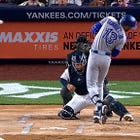Cubs Seek Outside Counsell
Four big-picture takeaways from an unprecedented managerial signing
The Chicago Cubs shocked the baseball world this week by naming Craig Counsell their new manager. Counsell, recently of the division-rival Milwaukee Brewers, signed a five-year, $40 million contract to come to the North Side, making him the highest-paid uniformed non-player in Major League Baseball history. His leaving Milwaukee for a raise was expected, but most assumed Counsell would head to New York to reunite with longtime Brewers executive and newly minted Mets President of Baseball Operations David Stearns. The Cubs had not been connected to Counsell at all, not least because they already had David Ross on board as their skipper, and they had publicly (and reportedly internally, until Counsell became available) committed to Ross long past the point in the offseason when teams usually make managerial changes.
Then again, given that this is the second time in recent memory that the Cubs have pulled such a move, maybe it shouldn’t have been a surprise. There are clear parallels between Counsell following Stearns out the door and ending up at Wrigley Field this year and 2014, when the Cubs hired longtime Tampa Bay Rays manager Joe Maddon, who was on the market himself after the Los Angeles Dodgers poached Andrew Friedman to run their front office, even though Rick Renteria would have otherwise kept his job.
I make a specific effort to avoid writing about day-to-day MLB news in depth, both because there are so many outlets out there that already cover this beat well, and because I know from past experience that doing so would quickly suck up all my time. But Counsell’s signing illustrates some fascinating trends in how baseball is evolving and how both teams and fans see the game. So here are a few high-level takeaways from the Cubs’ managerial switcheroo.
The non-player labor market is changing
Many years ago, I became convinced that there was a significant disconnect between how much MLB teams are willing to spend on free agent players and how comparably little they were willing to invest in other employees whose work affected the results on the field: coaches, scouts, analysts. In my 2014 paper If You Build It: Rethinking the Market for Major League Baseball Front Office Personnel, I made the case that teams should significantly expand their non-player payrolls, meaning both hiring more staff and paying higher wages to attract and retain talented employees. In addition to the principle of compensating workers at closer to the value they provide, I argued, doing so would provide a strong return on investment via the baseball smarts you would lure to your organization.
Much has changed in the near-decade since I published my research: employee rosters have swelled across the league, non-player salaries have generally increased, fans and writers are more sensitive to the labor implications of terms like “replacement level” and “surplus value.” I certainly have a clearer perspective about how MLB teams operate now than I did when I was in undergrad. Yet I still believe the league has a ways to go before the labor market achieves a point of rational equilibrium.
The last year may have signaled an inflection point in terms of well-respected organizational leaders showing confidence in their worth. (Another parallel with 2014.) Stearns departed the Brewers in September to run the Mets for a record-breaking salary of $10 million per year. Trailblazing Miami Marlins GM Kim Ng, fresh off leading the organization to their first full-length-season playoff berth in 20 years, just turned down a contract extension and quit her job rather than accept an insulting organizational restructuring; Houston Astros GM James Click made the same choice after receiving a below-market extension offer last November. I can’t remember an instance where as many candidates declined to interview for such an opening as with the Boston Red Sox’ recent vacancy, which was not seen as a particularly attractive opportunity but nonetheless represented one of a scant 30 such chances in the world to run an MLB team.
Counsell decided to test the open market — a rare occurrence for managers, who conventionally become available only by getting fired — and it paid off. After garnering interest from at least five teams, he was rewarded with a precedent-shattering contract from a club that already had a reasonably well-liked manager on staff. Will other well-regarded managers start turning down contract extensions to become free agents themselves?
…but it’s not rational yet
Counsell’s $8 million annual salary has some (probably unintentional) symbolic value: It lines up with what FanGraphs, and therefore most public-facing baseball analysis, uses as the current estimate for the cost of a win on the free agent market. In a conceptual framework where wins are fungible — a philosophy prior generations of sabermetricians (myself included) often presented too didactically, but that nonetheless is key to understanding the MLB player market — it should hold that spending $8 million on a free agent means you expect to move up one game in the standings, whether the new signing is a manager or a fifth starter.
That doesn’t align with the demonstrated perception of Counsell as an elite clubhouse presence for whom the Cubs believed it was worth firing their incumbent manager. No one really knows how many wins a manager is worth per season, but the gap between the best and worst in the league is probably more than one. Over 162 games, the little things add up: tactical decisions, oversight of the coaching staff, liaising with the front office. And of course fostering clubhouse chemistry has an impact. Either the cumulative potential impact of optimizing these myriad factors is roughly on par with upgrading your backup catcher, or the best manager in the Majors should be making a lot more than $8 million. The Mets had clearly coveted Counsell and haven’t been shy about shelling out for difference-making talent since owner Steve Cohen took over the team. Why didn’t they outbid the Cubs at that price? They probably would have been a softer landing spot for Counsell too, at least at first, because…
Against advice of Counsell
When the Cubs ended the 2023 season a game shy of making the playoffs, there was speculation that Ross would be on the hot seat. The team brass shut that down quickly. “He’s our guy,” club Chairman Tom Ricketts vowed. It was a very different situation than, say, the Mets’ Buck Showalter, whose dismissal was announced shortly before the team’s last game of the year. The typical window for making a managerial change had long passed; Cubs players, coaches, and support staff had been expecting to see Ross in the locker room when they showed up for Spring Training in February. A report in the aftermath of Monday’s announcement said players were “taken aback” by the news. And how could they not be?
I have no insight into the Cubs’ individual psyches. For all I know, there are players who wanted Ross removed last month and are relieved about the belated change. But a significant portion of the clubhouse presumably supported Ross (otherwise he would have been gone from the get-go), and even those who might have wanted a new voice could be turned off by how abruptly the organization went about it. Will Counsell’s would-be honeymoon period be marred by resentment about what happened to Ross? Will there be lingering distrust between the locker room and the front office over the team brass’ lack of transparency?
Building clubhouse cohesion is arguably the most important thing a manager can do. Counsell’s skill in this regard is part of why he earned a record-breaking contract. Yet the mere act of hiring him probably made the locker room atmosphere worse. To use an analogy with which Counsell is surely familiar, the advantage you get from pinch-hitting is mitigated by the superior hitter coming in cold off the bench. That Chicago committed to this potential messiness reflects either a very strong belief in Counsell’s ability to foster chemistry or a heterodox view of where a manager’s value comes from. I’m fascinated by the fundamental paradox of the Cubs’ decision, and I wonder what made them so confident that the end result will be worth it (and $40 million).
The Chicago fire
As the shock of Counsell’s hiring subsided across the industry, there was a popular outpouring of sympathy for Ross, the unsuspecting and undeserving casualty of one of the most-surprising firings in recent MLB history. However sensitively the Cubs may have tried to handle the situation, there’s no possible version of this story that isn’t agonizing and humiliating for the newly former “our guy.”
But the feeling can’t be wholly unfamiliar. As a player, Ross changed teams seven times during his MLB career. Twice he was traded at the end of Spring Training. Once he was released in August. Every free agent contract he signed was either a minor-league deal or explicitly described as for a backup role. Fans didn’t bemoan how unfair it was for Ross’ employers to cast him off at midseason or acknowledge that he was less talented than his teammates. Why is the reaction so different now that he’s on the other side of the roster sheet?
There are two possible ways to reconcile this double standard. The first is to harden your heart to Ross’ fate. To dismiss it as a standard business decision in an industry that he, and everyone, knows is unforgivingly hard. I would humbly suggest shifting in the other direction, and thinking and talking more sympathetically about players. Every day in this cruel, beautiful game, athletes are released, demoted, told they are not good enough to achieve their lifelong goal; they can be shipped across the country at a moment’s notice for a job with no long-term security. Heartbreak looks like a Complex League roster move.
Whenever a team talks about needing to upgrade a given part of their roster, they are signaling their intention to do to one of their players the same thing that the Cubs just did to Ross. It’s an unavoidable part of the game, and it’s not practical to hold a vigil every time a player loses their starting job or gets designated for assignment. But when Shohei Ohtani signs his mega-deal this winter, maybe you can spare a thought for whoever’s roster spot he takes.







Some good points here. Thank you. It does seem as though the cubs are playing the “long game” to some degree, foregoing whatever negativity that might come in the short term as a result of this move, and be,Irving that counsel will ultimately be the best man for the job.
Thought provoking stuff. Thanks
Good stuff